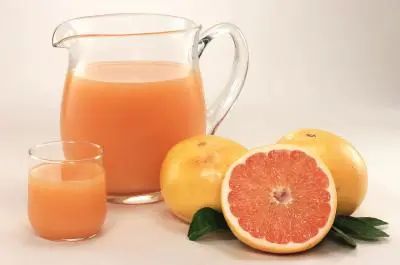The list of drugs that should not be taken with grapefruit juice is getting longer, British specialists warn in a report published by the Canadian Medical Association Journal.
Grapefruit juice slows down the metabolism of many pharmaceuticals, which may lead to a dangerous increase in their level in the patient’s body.
Lawson Health Research Institute specialists say that in just the last five years, from 2008 to 2012, the number of known medications with which grapefruit juice causes serious interactions has increased from 17 to 43. These are cardiac preparations such as verapamil and amiodarone, oncology preparations, statins (drugs that lower blood cholesterol levels) and immunosuppressants (preventing the recipient from rejecting a transplant).
Prof. David Bailey, one of the report’s authors, said in an interview with the BBC that grapefruit juice slows down the metabolism of these drugs to such an extent that if you take just one tablet, the effect could be as high as 5 to 10 lozenges. He admits that it rarely happens, but when it does, the consequences can be very dangerous.
These adverse interactions can result in gastric bleeding, cardiac arrhythmias, respiratory distress, kidney damage, and even sudden death.
The scientist cites tests in which the absorption of felodipine, a drug that dilates blood vessels and lowers blood pressure, was compared after drinking a glass of water or grapefruit juice. It turned out that the juice caused three times the concentration of this drug.
Grapefruit juice contains furanocoumarin, a derivative of coumarin, which inhibits the breakdown of some drugs in the digestive tract before they even enter the bloodstream. This process is included in the dose development of the formulations. However, when this mechanism is disrupted, the drug penetrates too high a concentration.
“By drinking the drug with grapefruit juice, we unconsciously increase the concentration of the drug in the body from a therapeutic level to a toxic level” – warns the Canadian specialist. Many patients are unaware of this, and doctors usually do not ask patients what their medications are drinking from.
Dr. Katarzyna Wolnicka from the Food and Nutrition Institute in Warsaw claims that grapefruit juice also slows down the metabolism of antihistamines, i.e. antiallergic drugs (reducing the secretion of substances that contribute to hypersensitivity – PAP). The result is an increase in its concentration by up to three to seven times and heart rhythm disturbances.
Other fruits, such as bitter orange and giant pomelo orange, can also cause serious drug interactions. Sweet orange does not cause dangerous interactions. Milk does not hinder the absorption of antibiotics in the gastrointestinal tract.
Products containing large amounts of fiber reduce the effects of digitalis and tricyclic antidepressants (such as amitriptyline), as they also worsen their metabolism.
People taking bisphosphonates, drugs for osteoporosis, should not eat foods, especially calcium-rich foods such as milk and dairy products, for 2 hours after taking them. You should also refrain from consuming vitamins with microelements and antacids, argues Dr. Wolnicka.
In her opinion, calcium can negatively affect the action of the so-called calcium channel blockers used to treat high blood pressure. It also worsens the absorption of beta blockers, one of the most important drugs in cardiology, used e.g. in heart failure. (PAP)










